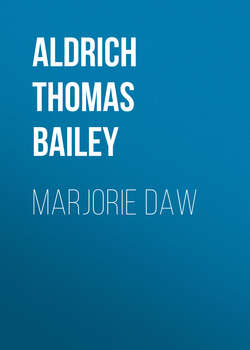Читать книгу Marjorie Daw - Aldrich Thomas Bailey - Страница 2
II
ОглавлениеEDWARD DELANEY TO JOHN FLEMMING, WEST 38TH STREET, NEW YORK
August 9, 1872.
My Dear Jack: I had a line from Dillon this morning, and was rejoiced to learn that your hurt is not so bad as reported. Like a certain personage, you are not so black and blue as you are painted. Dillon will put you on your pins again in two to three weeks, if you will only have patience and follow his counsels. Did you get my note of last Wednesday? I was greatly troubled when I heard of the accident.
I can imagine how tranquil and saintly you are with your leg in a trough! It is deuced awkward, to be sure, just as we had promised ourselves a glorious month together at the sea-side; but we must make the best of it. It is unfortunate, too, that my father’s health renders it impossible for me to leave him. I think he has much improved; the sea air is his native element; but he still needs my arm to lean upon in his walks, and requires some one more careful that a servant to look after him. I cannot come to you, dear Jack, but I have hours of unemployed time on hand, and I will write you a whole post-office full of letters, if that will divert you. Heaven knows, I haven’t anything to write about. It isn’t as if we were living at one of the beach houses; then I could do you some character studies, and fill your imagination with groups of sea-goddesses, with their (or somebody else’s) raven and blonde manes hanging down their shoulders. You should have Aphrodite in morning wrapper, in evening costume, and in her prettiest bathing suit. But we are far from all that here. We have rooms in a farm-house, on a cross-road, two miles from the hotels, and lead the quietest of lives.
I wish I were a novelist. This old house, with its sanded floors and high wainscots, and its narrow windows looking out upon a cluster of pines that turn themselves into aeolian harps every time the wind blows, would be the place in which to write a summer romance. It should be a story with the odors of the forest and the breath of the sea in it. It should be a novel like one of that Russian fellow’s—what’s his name?—Tourguenieff, Turguenef, Turgenif, Toorguniff, Turgenjew—nobody knows how to spell him. Yet I wonder if even a Liza or an Alexandra Paulovna could stir the heart of a man who has constant twinges in his leg. I wonder if one of our own Yankee girls of the best type, haughty and spirituelle, would be of any comfort to you in your present deplorable condition. If I thought so, I would hasten down to the Surf House and catch one for you; or, better still, I would find you one over the way.
Picture to yourself a large white house just across the road, nearly opposite our cottage. It is not a house, but a mansion, built, perhaps, in the colonial period, with rambling extensions, and gambrel roof, and a wide piazza on three sides—a self-possessed, high-bred piece of architecture, with its nose in the air. It stands back from the road, and has an obsequious retinue of fringed elms and oaks and weeping willows. Sometimes in the morning, and oftener in the afternoon, when the sun has withdrawn from that part of the mansions, a young woman appears on the piazza with some mysterious Penelope web of embroidery in her hand, or a book. There is a hammock over there—of pineapple fibre, it looks from here. A hammock is very becoming when one is eighteen, and has golden hair, and dark eyes, and an emerald-colored illusion dress looped up after the fashion of a Dresden china shepherdess, and is chaussee like a belle of the time of Louis Quatorze. All this splendor goes into that hammock, and sways there like a pond-lily in the golden afternoon. The window of my bedroom looks down on that piazza—and so do I.
But enough of the nonsense, which ill becomes a sedate young attorney taking his vacation with an invalid father. Drop me a line, dear Jack, and tell me how you really are. State your case. Write me a long, quite letter. If you are violent or abusive, I’ll take the law to you.
